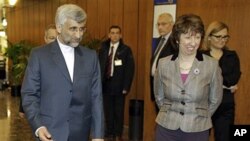Iran and world powers are holding their first talks in more than a year, in the Swiss city of Geneva.
The two days of Geneva talks are being headed by the European Union's foreign policy chief Catherine Ashton and Iran's chief negotiator Saeed Jalili. They mark the first meeting since October 2009 between Tehran and representatives of six world powers - Britain, China, France, Germany, Russia and the United States.
They occur amid a series of new developments, including Iran's claims Sunday it had domestically produced uranium concentrates, known as yellowcake. This is key to enriching uranium, which can be used for either peaceful civilian purposes like generating electricity or for military ends - like making an atomic weapon.
World powers fear Iran wants to make a nuclear bomb, although Tehran insists its nuclear program is entirely peaceful.
David Albright is president of the Institute for Science and International Security, a Washington, DC-based policy group that tracks nuclear proliferation. Despite Iran's tough rhetoric, he believes the country faces more pressure from the international community than it did a year ago, including the threat of new and tougher sanctions. "Part of the purpose of these negotiations is to test. Is Iran, under all this pressure, willing to start making compromises and willing to discuss an alternative future for its nuclear program? One where it is fully integrated into the international system?," he said.
The talks also follow bombing attacks against two top Iranian nuclear scientists and Tehran's acknowledgement of Internet attacks on some of its centrifuges that are used to purify uranium. New revelations by WikiLeaks also underscore deep concerns about Iran on the part of other Middle Eastern nations.
Albright says Washington and other world powers hope the negotiations will not end in Geneva. "Certainly one of the things the U.S. would want to set up is a process of future negotiations. I do not think anybody wants just two days of talks and then they do not meet again for a year," he said.
Meanwhile, some Arab countries have criticized the discussions for not including Iran's neighbors.
Iran Discussing Nuclear Program in Geneva




